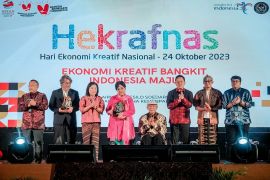Under the vision, Indonesia targets to increase its per capita income to US$30,300, among other things.
At the Investor Daily Round Table event on Wednesday, Uno urged businesses in Indonesia to be wise in responding to Indonesia's tax policies, according to a press release from his ministry on Thursday.
"The entertainment tax aspect actually has a philosophical basis for the strengthening of our tax reform aspect in a bid to achieve the 2045 Golden Indonesia," he said.
Uno explained that the government has issued a regulation regarding the implementation of entertainment tax to avoid burdening businesses.
Law Number 1 of 2022 on the Central Government and Regional Governments' Financial Relations (HKPD Law) came into effect in January 2024.
Uno said that discussions on the HKPD Law were not carried out comprehensively because the COVID-19 pandemic was still a main focus at that time.
"However, in the national coordination meeting of the Ministry of Tourism and Creative Economy in late 2022, several associations discussed a possible tax increase that will really burden the tourism sector," he said.
The HKPD Law stipulates certain goods and services tax for entertainment services at pubs, karaoke bars, nightclubs, bars, and spas as low as 40 percent and as high as 75 percent.
The taxes have been determined based on the consideration that those types of entertainment are only enjoyed by certain groups of people. Thus, the government has set a lower limit to prevent business players from lowering tax rates to increase their business turnover.
The government said that the entertainment tax is a form of support for the development of tourism in regions.
However, several business and industry players have described the government's decision to set the entertainment tax in the range of 40 to 75 percent as unsuitable and burdensome.
Among those who have protested against the decision is the deputy chairperson for regional autonomy development at the Indonesian Chamber of Commerce and Industry (Kadin), Sarman Simanjorang.
He argued the policy is unsuitable, considering the tourism industry's recent recovery following the pandemic.
Related news: Government to issue circular letter on entertainment tax incentives
Related news: No need for concern over entertainment tax increase: Uno
Translator: Shofi Ayudiana, Raka Adji
Editor: Anton Santoso
Copyright © ANTARA 2024












